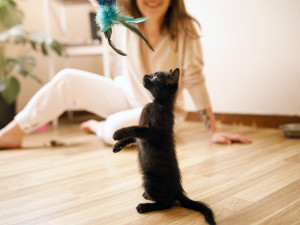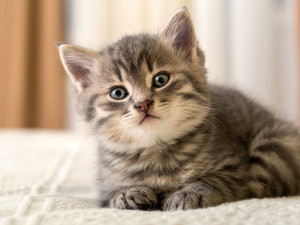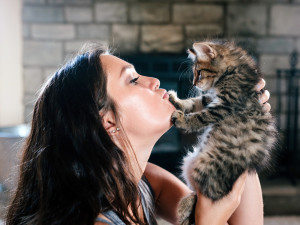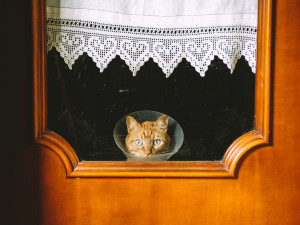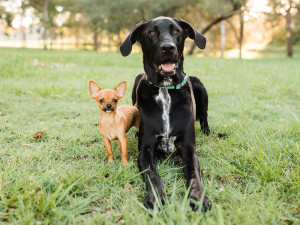Kitten Teething: Do Kittens Lose Their Teeth?
Get those little gnashers ready for the kitten tooth fairy

Share Article
In this article:
What is teething? When do kittens lose their baby teeth? Signs of kitten teething How to help a teething kitten Kitten dental hygiene tips
“Kitten teething” refers to the natural process during which a kitten’s baby teeth, also called deciduous teeth, are gradually replaced by their permanent adult teeth. This transition usually starts around 3–4 months of age and can last until about six months old.
What is teething?
Teething is the process of teeth erupting through the gumline. Kittens are born without teeth (who needs teeth for nursing, anyway?) and go through two courses of teething processes: once when their kitten (deciduous) teeth erupt and again when their adult teeth come in.
As kittens grow, their bodies go through rapid development, which causes some physical and behavioural changes. Kitten parents should be aware of what to expect when their felines have kitten teeth versus cat teeth.
When do kittens lose their baby teeth?
Kittens start to get their first set of teeth around three weeks of age and have a complete set of tiny chompers by eight weeks. Adult teeth start to come in around three months of age and become a full set of permanent teeth by seven months of age. Kittens only have 26 deciduous teeth, but cats have a full set of 30 adult teeth.
Kitten teething age timeline
When kittens start teething, it doesn’t happen all at once. A kitten developing a completely new set of teeth within a day or so would be kind of weird. The process happens so discreetly that most kitten parents don’t even realise when their kitty loses or gains a tooth. Wondering when kittens get adult teeth? Here’s a quick timeline of the teething process:
Birth: kittens are born without teeth.
3–4 weeks: deciduous canine and incisor teeth start to erupt.
5–6 weeks: deciduous premolar teeth come in.
Eight weeks: a kitten should have a full set of 26 baby teeth, made up of four canines, 12 incisors and 10 premolars.
11–12 weeks: adult incisor and canine teeth start to erupt.
16–20 weeks: adult premolars and molars start to erupt.
6–7 months: a kitten should have a full set of 30 permanent teeth, made up of four canines, 12 incisors, 10 premolars and four molars. Cats don’t have baby molars, they only have one set with their adult teeth.
Signs of kitten teething
Kitten parents may notice some physical and behavioural changes when their kitten is teething. A quick peek in the mouth can show gaps between teeth along the gumline or inflamed gums. Physical signs can also include finding a stray tooth lying around.
Finding loose teeth is uncommon because kittens typically swallow their baby teeth, but a tooth can come out while a kitten is playing and chewing on toys. Kitten parents may also spot small spots of blood on toys or bedding.
Behavioural changes seen with kitten teething may be more noticeable. Signs of kitten teething may include:
drooling
reluctance to eat
dropping food
excessive chewing on toys and other objects
rubbing or pawing at their face
avoiding being pet on the face or head
decreased playfulness
How to help a teething kitten
Teething can be uncomfortable for some kittens. Though it’s a natural process, no cat parent wants to see their kitten being cranky or in pain. However, there are a few things kitten parents can do to ease the process.
Handle with care
Avoid games that may put extra pressure on a kitten’s teeth and gums, such as tug-of-war. Some kitties may become a little head shy if they think you’re going to touch their sore cheeks. Keep cuddles focused on their bodies and be extra gentle when stroking their head or face.
Provide chew toys
It’s normal for kittens to get a sudden urge to chew any and everything while they’re teething. Provide soft chew toys to give them something to sink their teeth into during the process.
Kitten-proof your home
Much like a kitten who plays with the packaging of a new toy instead of the toy itself, some kittens will seek out alternative objects to chew on even if you give them chew toys. Eliminate access to electric cords, wires, house plants, leather shoes (puppies aren’t the only shoe chewers), and small plastic or rubber objects that can accidentally be swallowed.
Feed soft food
Chewing on dry cat food can be uncomfortable for a kitten and lead to dropping food or a reluctance to eat. Soften dry food with warm water or offer wet food, and make sure their food intake is consistent so they get all the nutrients they need to grow and thrive.
Offer a cool cloth
Kitten parents can help soothe inflamed gums by providing a DIY dummy. Offer your kitten a cool, damp cloth to gnaw on. Make sure that there are no loose threads that can be accidentally swallowed and keep your fingers out of harm’s way.
Kitten dental hygiene tips
More than 50 percent of cats will have some form of dental disease by age four. That’s why brushing your cat’s teeth is highly encouraged. And the earlier toothbrushing is introduced, the easier it tends to be. However, toothbrushing should be put on hold during kitten teething to avoid causing additional pain and inflammation. Toothbrushing can resume after a kitten has all of their adult teeth – after six or seven months of age.
Toothbrushing may be on hold, but that doesn’t mean that a kitten’s teeth should be ignored. Kittens can develop dental problems while teething. Kitten dental issues can include:
Retained deciduous teeth: sometimes a kitten’s baby teeth don’t fall out like they should. They stick around as the permanent teeth come in, causing crowding.
Delayed eruption of deciduous teeth: in addition to kitten baby teeth overstaying their welcome, some baby teeth don’t erupt through the gum line. This can happen if the gums are thick and fibrous.
Broken deciduous teeth: even though baby teeth are meant to fall out eventually, a broken baby tooth should not be ignored because it can lead to pain and infection.
When to see a veterinarian
Your veterinarian will take a peek at your kitten’s teeth during wellness visits, but you should keep an eye out for signs that your kitten is having dental problems. Signs of dental issues in teething kittens include:
extremely bad breath
facial swelling
discoloured drool
refusal to eat
excessive mouth pain
Frequently asked questions
When should I take my new kitten to the vet?
Newly adopted kittens should be evaluated by a vet soon after adoption to get their overall health checked. Kittens typically start vaccines at six weeks of age and have wellness visits scheduled every 3–4 weeks.
Why is my cat chewing on everything?
Excessive chewing is a common behaviour in cats that are teething. Kitten parents can provide teething toys and eliminate access to chewing hazards such as electric cords and house plants.
References:

Dr. Alycia Washington, DVM, MS
Alycia Washington, DVM, is a small animal emergency veterinarian with over ten years of experience based in North Carolina. She works as a relief veterinarianopens in new tab and provides services to numerous emergency and specialty hospitals. She also works as a veterinary writer with a focus on educating pet owners, and is the author, under the name A. C. Washington, of the children’s book Dr. Jett, Monster Vet.
Related articles
![cat with cone after vet visit]()
Doctor’s Orders: Cat Vet Visits Are Essential
Get thy cat to a vet, even if it’s a struggle to get them out the door
![Kitten sitting on a blanket]()
7 Steps to Keep Your New Kitten Happy and Healthy
A vet breaks down everything you need to know when you bring home a new kitten
![Woman playing with a black kitten.]()
Kitten Behavioural Milestones You Should Know
Keep track of all their fun phases with these guidelines
![Great Dane dog and Chihuahua dog laying in the grass]()
Wondering How Big Your Puppy or Kitten is Going to Get?
We know, our pets grow up too fast. But seriously, how fast is too fast (or slow)? Kinship and Waltham Petcare Science Institute created a simple tool to help your new pet’s growth stay on track

